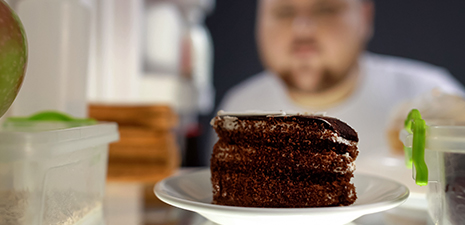What’s the difference between true hunger and fleeting cravings? Learn the science behind food cravings, and how to break free from them, with Nurse Barb Dehn.

A Different Approach to Weight Loss: Mindful Eating
Diet fads come and go. In the 70s, we downed SlimFast shakes and got in The Zone. The Cabbage Soup Diet, Scarsdale and Atkins (two low-carb, high-protein regimes) were all the rage in the 80s followed by South Beach in the 90s. Today, ketogenic, HCG, the Master Cleanse (aka the Lemonade Diet), Dukan, and Intermittent Fasting are hyped as the hottest weight loss tickets. With society’s emphasis on weight and thinness, dieting has become a national pastime. Everyone is looking for quick weight-loss solutions. But do any of these regimes work?
The Problem With Fad Diets
According to research conducted by Traci Mann, associate professor of psychology at UCLA, “Diets do not lead to sustained weight loss or health benefits for the majority of people. You can initially lose 5 to 10 percent of your weight on any number of diets, but then the weight comes back.”1
Fad diets are a temporary fix for long-term problems, and some may even harm your health. Many lack important, major nutrients like dietary fiber, vitamins, minerals and carbohydrates. Some eliminate entire food groups. Others, like the grapefruit or cookie diet, encourage you to eat a limited number of foods. If you do experience rapid weight loss you may also lose muscle and bone along with the pounds. The dramatic weight loss some dieters experience on low-carb diets is often just water weight because when you cut carbohydrates your body metabolizes glycogen (stored glucose) for energy, which requires water. Plus, these diets don’t teach you how to change your behavior, so once the diet ends (and really, who can stick to boring, rigid meal plans and calorie deprivation for very long?) and you resume your regular eating habits, the weight is regained.
Failing over and over again is demoralizing, depressing, and frustrating and can set you up for a diet-binge cycle. You restrict calories throughout the day. By evening you’re famished and can’t stop yourself from consuming a carton of ice cream or an entire bag of cookies or chips. The loss of control and overeating can trigger guilt, shame, self- loathing and a sense of powerlessness over food.
A Better Way to Lose Weight
Fortunately, there’s an alternative, effective strategy for weight loss that’s better than so-called fad diets: mindful eating. I practice it myself, and have taught hundreds of my clients how to eat mindfully with fantastic results and no deprivation. Unlike dieting, mindful eating is enjoyable, and results in long-term success because you’re not changing just what and how much you eat, but how you eat and relate to food and your body.
Mindful eating has many benefits. Health and energy improve because you learn to let go of eating to lose weight and instead focus on eating to fuel your body and wellbeing. As you start to pay attention to how certain foods make you feel, you make smarter choices, improving the overall nutritional quality of your diet.
What Is Mindful Eating?
Mindful eating is actually not a diet—it is a technique for managing your eating habits. Rather than following strict rules or counting calories or points you’re encouraged to tune within, listen to your body’s signals of hunger and satiety and use your intuitive wisdom to find a way of eating that works for you. While at first this approach can be challenging and even scary, over time you develop the ability to select the right types and amounts of food that you need to feel satisfied, nourished and nurtured.
Mindful eating is based on the ancient Buddhist concept of mindfulness, which entails maintaining a moment-by-moment awareness of your thoughts, feelings, body sensations, and environment in a nurturing, gentle, nonjudgmental way. Essentially, mindfulness involves paying attention to what you’re experiencing while you’re experiencing it. As Jon Kabit-Zinn, creator of the Center for Mindfulness in Medicine, Health Care, and Society explains, mindfulness is: “The awareness that emerges through paying attention on purpose, in the present moment, and nonjudgmentally to the unfolding of experience moment to moment.”2
Applied to eating, rather than blasting through meals and consuming food while you drive, work, watch television, or scan your cellphone, you slow down, remove distractions, and pay attention to what you’re eating. Staying in the moment, you observe yourself eating and engage all your senses noticing smells, tastes, sounds, colors, and textures of food. Instead of judging, criticizing and berating yourself for not eating “perfectly” or “cleanly” you let the guilt, fear, and worry go. The focus is on accepting things as they are and being kind and compassionate towards yourself and your body.
An Evidence-Based Approach for Weight Loss
While the goal of mindful eating is changing eating behavior, not weight loss, research shows it can help you reach and maintain a healthy weight. A systematic review of 19 mindfulness-based interventions for weight loss found significant weight loss in over two-thirds of the studies.3 Another study found that even one brief mindfulness exercise increased the enjoyment of food and had a positive impact on eating behavior.4
Mindful eating supports weight loss for several reasons. First you discover the difference between true hunger, which is a bodily sensation (e.g. experiencing a growling tummy, feeling lightheaded or low in energy), and non-hunger cues that trigger eating (e.g. seeing or smelling food or experiencing difficult emotions). Automatic, mindless eating is replaced by thoughtfulness and the ability to eat when you’re hungry and stop when you’re full. Slowing eating speed is encouraged, and since it takes about 20 minutes for your body to feel full, you eat less. Plus, as you practice mindfulness, stress, which is a major cause of overeating, is also reduced.
So if fad diets haven’t worked for you, try mindful eating. Not only will the approach help you lose weight, end eating struggles, and develop lifelong healthy habits; practicing mindfulness will also enable you to live more fully and joyfully.
Rx Only. For the safe and proper use of Plenity or more information, talk to a healthcare professional, read the Patient Instructions for Use.
- https://newsroom.ucla.edu/releases/Dieting-Does-Not-Work-UCLA-Researchers-7832
- https://www.mindful.org/jon-kabat-zinn-defining-mindfulness/
- Olson KL, Emery CF. Mindfulness and weight loss: a systematic review. Psychosom Med. 2015;77(1):59–67. doi:10.1097/PSY.0000000000000127
- Arch, Joanna & Brown, Kirk & Goodman, Robert & Porta, Matthew & Kiken, Laura & Tillman, Shanna. (2016). Enjoying food without caloric cost: The impact of brief mindfulness on laboratory eating outcomes. Behaviour Research and Therapy. 79. 10.1016/j.brat.2016.02.002.





